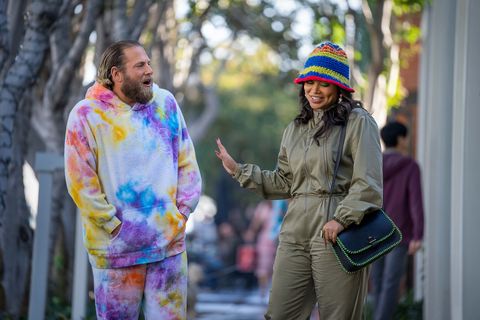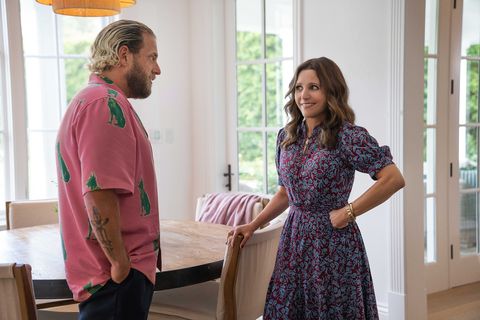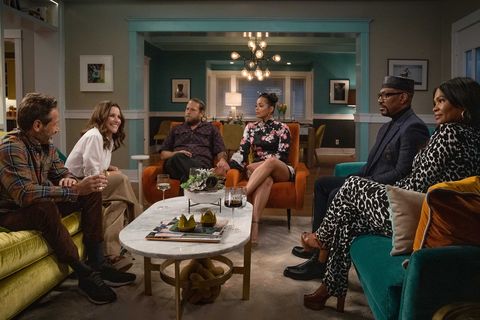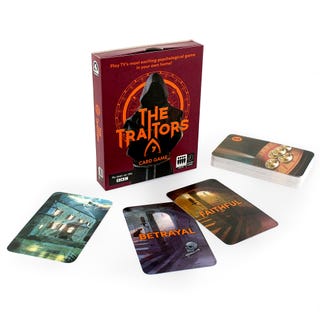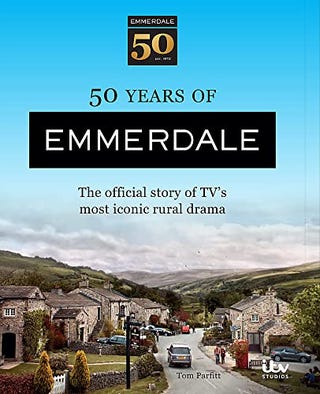You People stars Eddie Murphy and Jonah Hill as at-odds potential father- and son-in-law. Hill, who co-wrote with Kenya Barris (who also directed), plays the mid-3os Ezra, who is stuck in a job he doesn't like while pursuing his passion, a culture podcast with his best friend Mo, in which the pair — white-Jewish and Black — discuss culture with tongue firmly in cheek.
At the heart of the movie is the gulf between the individual white (and in this case, Jewish) person and Black (and in this case, muslim) person. It's a very specific dynamic meant to represent a wider societal gap that is always down to the individual to cross.
Ezra and his paramour Amira (Lauren London) seek to do just that. They are truly good for each other, and the film takes the time to watch their relationship grow in a way that makes you believe they really are a couple.
It's their families that struggle to gel. However, and cleverly, both Ezra and Amira are products of their upbringings, and their own loyalties to their parents are tested as they face the fact that love might not be enough to keep their relationship from falling apart.
There is a good pace to the film, which never languishes too much in the more sentimental moments. If you can stand second-hand embarrassment, you'll have a much better time with the humour of You People, but for those of us who cringe whenever someone is slightly uncomfortable, you'll struggle.
That being said, what stops the film from slipping into farce is the strength of its actors, particularly the aforementioned Murphy and Julia Louis-Dreyfus as Ezra's stereotypically overbearing Jewish mom Shelley. There is an unbearably tense but still funny moment in which the two spar about comparing slavery to the holocaust, and reverence for an Imam who empowers Black people but has said awful things about Jews.
These dynamics are something we — people who fall into one or both cultural/ethnic categories — deal with on a daily basis, so to see it distilled into a clear argument between two people — each symbolic of opposing sides — can be entertaining but also feels a bit hollow.
Louis-Dreyfus plays the ignorant 'well-meaning' white person very well (ie you kind of want to die whenever she opens her mouth) but you don't get a sense of who she is beyond her purpose to the plot.
Likewise for Murphy's Akbar, we only get glimpses of the man behind the symbolism, and the film doesn't do enough to distinguish between the anxieties he feels and where they blur into a traditional view about 'giving one's daughter away'.
Still, none of these themes is actually examined in a deeper way – comments about Jews and money or Black people and fried chicken are presented with only the context of what we, the audience, know about the film – there isn't an interrogation of it by the characters in a way that feels real.
The moments that feel the most resonant are in which Ezra and Amira confront their respective opponents – London in particular delivers her Capital I Important monologue with heart and sincerity. However, You People is chiefly concerned with being a romcom, and that means happily ever afters that don't quite feel earned (or funny) in the same way that their initial getting together did.
All in all, You People feels like the first draft of a different movie, that at some point became a romcom and therefore didn't have to interrogate itself any further. Luckily, it has some serious star-power, with a cast who bring all their charismatic wattage to the forefront, making You People an above average romcom, even if it doesn't quite succeed in being the kind of punchy cultural critique that Mo and Ezra bring to their podcast.
You People is now available to watch on Netflix.





